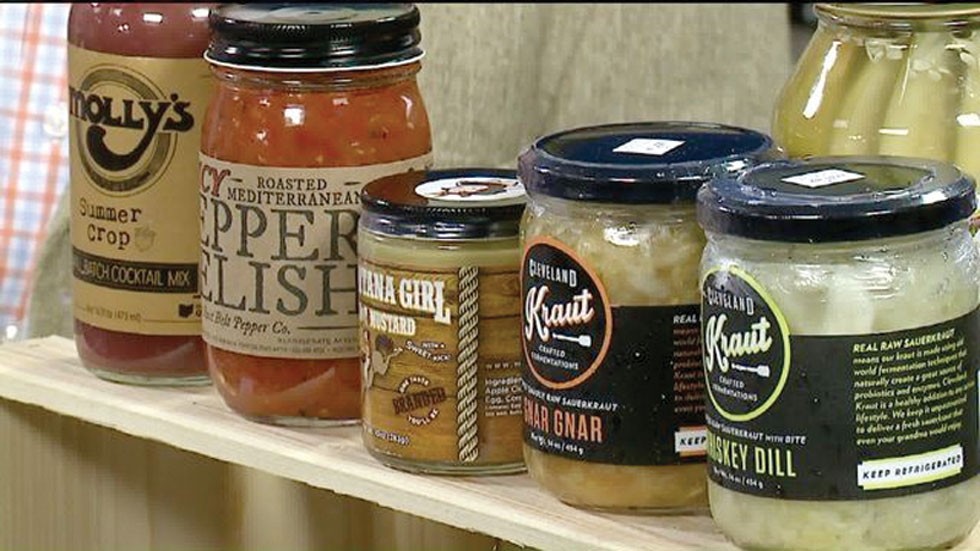For the past four years, the Cleveland Culinary Launch & Kitchen (CCLK) has helped small food startups make the transition from dream to reality, spinning out success stories like Cleveland Kraut, Randy's Pickles, Chill Pop Shop and Saucisson, to name a few. Under one roof, food-focused entrepreneurs have access to shared prep and cooking facilities, dry, cold and frozen storage space, and a professional incubator program to guide them every step of the way.
But what happens once those people cultivate an audience for their product? Where do they go next?
"When people outgrow our kitchens at CCLK, it's very expensive for them to build out their own space," explains partner Eric Diamond. "And while some of them can do it, others cannot and are forced to look at other options, like co-packing."
A co-packer, or contract packager, is a third-party entity that will manufacture, warehouse and ship your food products to your specifications. They make, you sell. But most co-packers are out of state, require very large minimum orders, and often wield control over what ingredients do and don't get used.
When Diamond and partner Gordon Priemer launch the new multifaceted Cleveland Food Hub, area producers will gain a local partner. Occupying one small sliver of a newly acquired 138,000-square-foot warehouse in Midtown, the co-packing facility will have small minimums for producers of everything from pasta sauce and salsa to energy bars and beef jerky. Proximity to your co-packer means you are nearby for quality control and when inevitable production snafus arise.
"It will also allow individuals who don't want to produce their own products to still be able to say that it is produced locally here in Cleveland," Diamond adds.
But the co-packing element might be the least exciting component of the Food Hub. Six individual kitchens will serve as rentable production space for the specialty food businesses of tomorrow. Unlike the shared commercial kitchens found at CCLK, these are all yours 24/7, notes Diamond. Each 700-square-foot space is outfitted with a hood, range, steam kettle or tilt skillet, prep space and hand-washing sinks. The cost will be $2,000 per month.
"There is a need for those niche spaces," adds Diamond. "We've been hearing for a long time, 'Hey, I'd love to have a gluten-free kitchen,' and we haven't been able to accommodate that [at CCLK]. Under this scenario, we will be."
This setup opens the door to certifications such as USDA Organic, Kosher, Halal and gluten-free. Tenants also will have access to shared-use dishwashing and storage outside of their individual kitchens. Plans call for more than 7,000 square feet of dry, cold and freezer storage space that will be available not only to CCLK and Food Hub tenants, but also the food community at large, offered at per-pallet prices. To facilitate loading and unloading, the facility will have three loading docks and one drive-through dock.
"Once we have this up and running, it will be the largest production facility for food in the state of Ohio," says Diamond.
Five startups already have expressed interest in the kitchen space, he says, with products that include fermented foods, bakery items and even a candy maker.
The final leg of the Cleveland Food Hub stool is retail. Souper Market has had both its production facility and retail soup shop at this location for years, and we recently shared the news that Cleveland Bagel will soon join them. But plans call for one or two additional food-based storefronts to fill the spaces in between. Given the recent development taking place in the neighborhood, Diamond says the demand already exists.
"We really think Midtown is a great location because of all the new businesses that have moved into the area and the food hasn't caught up yet," he says. "We looked at it like it was the perfect opportunity to add retail. Having Souper Market and Cleveland Bagel as anchors have brought out many more clients saying they want to be here too."
Shoppers will have access to free parking.
As for CCLK, Diamond says that the success of recent graduates like Cleveland Bagel prove that the nonprofit incubator's formula is working, an essential element of which is an eight-week program that covers food regulations, product development, packaging and marketing.
"We encourage everybody who has never been in food production before to go through our incubator course," he explains. "If you look back at the most successful companies who have come out of the kitchen, they all followed the same path, which was: take the course, produce a product, sell at farmers markets for a year, get a following, and then go into retail."
The kitchens should be up and running by spring, with retail to follow.


